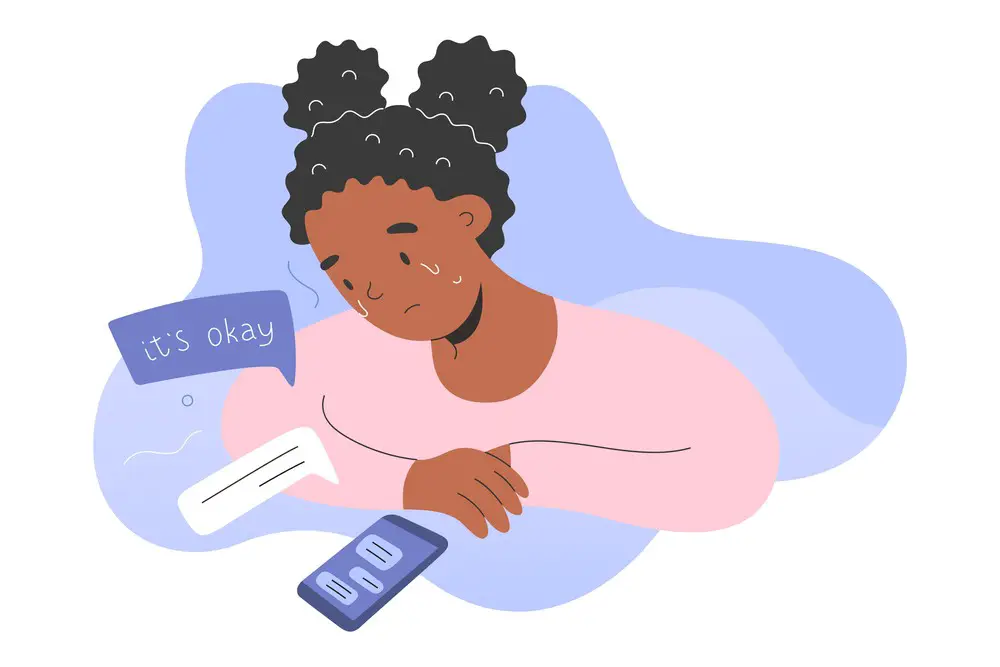As a BetterHelp affiliate, we receive compensation from BetterHelp if you purchase products or services through the links provided
We all need help from time to time, especially regarding mental health issues like stress, anxiety, or depression. Asking your parents for therapy is a big step towards getting the support you need; however, there are important considerations involved in finding the right therapist.
In this blog post, we will discuss how to ask your parents for therapy without feeling embarrassed or ashamed of yourself. We’ll also explore offline vs. online therapy options and tips on dealing with the stigma around mental health issues and preparing for an appointment with a therapist. Finally, we’ll provide some aftercare advice so that you can maintain good mental wellness even after treatment has ended – let’s get started!
Table of Contents:
What is Therapy?
Therapy is a form of treatment that helps people to cope with mental health issues, such as anxiety and depression. It can also address physical ailments, such as chronic pain or illness. Therapy involves talking about your feelings and experiences to gain insight into yourself and develop better coping strategies for dealing with life’s challenges.
Definition of Therapy: Therapy is a type of counseling that uses psychological techniques to help individuals identify patterns in their thoughts, feelings, and behaviors to create positive change. Therapists work with clients individually or within group settings depending on the client’s needs. The goal of therapy is not only symptom relief but also improved functioning overall.
Types of Therapy: There are many different types of therapy available, including cognitive-behavioral therapy (CBT), dialectical behavior therapy (DBT), psychodynamic therapy, interpersonal psychotherapy (IPT), and acceptance and commitment therapy (ACT), among others. Each type has its unique approach, which may be more suitable for specific individuals than others depending on their particular needs and goals for treatment.
When Should You Ask Your Parents for Therapy?
Signs You Need Professional Help: It can be challenging to recognize when you need professional help. If you are feeling overwhelmed, having difficulty managing your emotions, or experiencing persistent negative thoughts, it may be time to seek therapy. Other signs include changes in sleep patterns, appetite, and energy levels; feelings of hopelessness or helplessness; an inability to concentrate; and a lack of interest in activities that used to bring joy.
Talking To Your Parents About Seeking Help: Asking for help is not easy, but it’s important to remember that your parents want what’s best for you. When talking with them about seeking therapy, ensure they understand why you think this could benefit them and how it will help manage the issues. Be honest with them about how their support would mean a lot and explain any fears or hesitations that might come up during the conversation.
Before speaking with your parents, take some time to reflect on why therapy is essential for you and how it can improve your mental health journey. Make sure to have resources ready such as therapist recommendations from friends or family members who have gone through similar experiences, so they know where to start looking if needed. Additionally, consider writing down points ahead so nothing gets forgotten during the discussion, which can provide clarity when expressing yourself more effectively.
How do Offline and Online Therapy Compare?
Offline therapy is the traditional form where a patient meets with a therapist. It can be conducted in an office or other private space and typically involves face-to-face conversations between the patient and therapist. Pros of offline therapy include having direct access to your therapist for questions and feedback and building trust with them through regular contact. Additionally, it allows you to have more control over your environment during sessions, which can benefit some people who may feel anxious or uncomfortable talking about specific topics in public settings.
On the other hand, there are also cons associated with offline therapy, such as cost (which can vary depending on location), availability (it’s not always easy to find therapists that fit your needs), and scheduling conflicts (you may need to take time off work or school). Furthermore, if you live far away from potential therapists, it could mean long drives back and forth for appointments, adding additional stressors to your life.
Online therapy offers many of the same benefits as offline but without some of the drawbacks mentioned above. For example, online sessions are often much cheaper than offline due to reduced overhead costs such as rent and utilities. They provide greater flexibility when it comes to scheduling since patients don’t need to travel anywhere for appointments, plus they offer more anonymity which can make discussing sensitive topics easier for some people.

However, there are also downsides associated with online therapy, including potential technical issues like poor internet connection or audio/video lag which could disrupt communication between patient and therapist; lack of physical presence, meaning that nonverbal cues might be missed; difficulty building rapport since you won’t get any face-to-face interaction; plus privacy concerns due to data sharing policies by providers that aren’t always clear upfront.
When considering either option, budgetary considerations should also come into play when deciding what treatment best suits you. Both online and offline therapies have different costs associated, so it is essential to do research beforehand to know exactly what kind of financial commitment will be required before making any decisions regarding treatment options.
Dealing with Stigma Around Mental Health Issues
Mental health issues are still stigmatized in many parts of the world, making it hard for people to talk about their experiences and seek help. However, this stigma couldn’t be further from the truth. Seeking professional help shows strength and courage because it requires self-awareness and an openness to change, which aren’t always easy.
Common Misconceptions About Mental Health Treatment
One of the biggest misconceptions about mental health treatment is that it’s only for people with severe mental illnesses. In reality, therapy can be beneficial for anyone struggling with stress, anxiety, depression, or any other emotional issue. It can also help those dealing with trauma or difficult life transitions. Therapy isn’t just about treating a disorder; it’s about assisting individuals to gain insight into their thoughts and feelings to better cope with whatever challenges they may face.
Another misconception is that therapy takes too long to be effective. While some forms of treatment, such as cognitive behavioral therapy (CBT) are designed to provide short-term relief from symptoms, many therapists offer longer-term therapies that focus on more complex issues, such as relationship problems or childhood trauma. The time needed depends on the individual and their goals for treatment, but most people start seeing improvements within a few sessions.
Finally, there’s the belief that talking to a therapist means you have failed or are weak somehow – this couldn’t be further from the truth. Seeking professional help shows strength and courage because it requires self-awareness and an openness to change, which aren’t always easy.
Tips For Overcoming Stigma in Your Community
1. Talk openly about mental health issues and the importance of seeking help.
2. Educate yourself and others about mental health treatment by reading books or attending workshops.
3. Support organizations that work to destigmatize mental illness, such as NAMI (National Alliance on Mental Illness).
4. Look for support from friends and family who understand the importance of therapy and can validate your feelings and experiences.
5. Find online communities or forums to discuss mental health topics with like-minded individuals in a safe, nonjudgmental space.
6. Speak out against stigma when you see it in your everyday life – whether from someone close to you or through mass media sources like TV shows or movies.
7. Look for ways to destigmatize mental health in your circle of influence, whether it’s through open conversations or advocacy work.
8. Most importantly, don’t be afraid to take the first step and ask your parents for help in seeking out therapy if you need it – it can be one of the most empowering decisions you make! Remember, you have nothing to be ashamed of, and there is no reason to feel embarrassed when talking about your mental health needs. It’s time to start breaking stigmas around seeking professional help so that more people can get the support they need regardless of their background or circumstances.
Finding the Right Therapist for You
When it comes to finding a therapist, there are many things to consider. Finding someone qualified and experienced in treating your particular issue is essential. Here are some questions you should ask before choosing a therapist:
- What kind of experience do they have?
- Are they licensed or certified in their field?
- Do they specialize in any particular type of therapy?
- What is their approach to treatment?
It’s also essential to ensure that the therapist has good communication skills and makes you feel comfortable discussing your issues. If possible, try speaking with them on the phone or having an initial consultation before committing to treatment. This will allow you to understand better whether this person is right for you.
Different Types of Therapists and Their Specialties
Psychologists specialize in diagnosing, treating, and understanding mental illnesses. Psychiatrists are medical doctors who can prescribe medications and provide therapy. Licensed Clinical Social Workers (LCSWs) deal with relationships, family dynamics, and trauma issues. Marriage and family therapists (MFTs) help couples or families resolve conflict while dealing with communication problems or other issues.
No matter which therapist you choose, it’s essential to feel comfortable talking about your needs to get the most out of your sessions. That way, you can ensure that the therapy process is as beneficial as possible.
Preparing for Your First Appointment With a Therapist
What to Expect During Your First Session: When you first meet with your therapist, they will likely ask questions about why you are seeking therapy and your goals. They may also ask about any past experiences or treatments that have been helpful. It is essential to be honest, and open during this initial session so the therapist can get an accurate picture of your situation. After discussing these topics, the therapist will provide guidance on how best to proceed with treatment.
Your first appointment should also include time for you to discuss any concerns or questions about therapy or mental health in general. This is an excellent opportunity for both parties to become more comfortable with each other before beginning treatment. Additionally, it allows the therapist to understand your needs better and develop an individualized plan of care tailored specifically for you.
Once treatment begins, it is vital to ensure that you actively participate in each session by being open and honest about how things are going outside of therapy and within it. Additionally, take advantage of opportunities offered by your therapist, such as homework assignments or relaxation techniques which can help reinforce progress made during sessions and promote long-term success after leaving therapy altogether. Finally, don’t forget that communication between yourself and your therapist is critical; if something isn’t working out, let them know so adjustments can be made accordingly.
Aftercare Tips For Maintaining Mental Wellness After Treatment
Maintaining mental wellness after treatment is an essential part of the recovery process. Aftercare tips can help you manage stress and anxiety, build resilience, and maintain a healthy lifestyle.
Self-Care Strategies For Stress Relief: Self-care strategies are essential for managing stress levels and maintaining emotional balance. Examples of self-care activities include yoga or meditation, journaling, deep breathing exercises, listening to music or podcasts, spending time in nature, engaging in creative pursuits such as painting or drawing, getting enough sleep each night, and eating nutritious meals. Regular breaks from work or other responsibilities can also be beneficial for reducing stress levels.
FAQs
How do you get a therapist if your parents say no?
Finding a therapist if your parents say no can be difficult, but it is possible. Start by researching therapists in your area who offer sliding scale fees or accept insurance. You may also consider online therapy options that are more affordable and convenient. If you’re still unable to find an option that works for you, contact local mental health organizations or universities with counseling centers. Lastly, don’t forget about free resources such as hotlines and support groups which can provide emotional support while you search for a therapist.
Can therapists legally tell your parents?
No, therapists cannot legally tell your parents without your consent. In most cases, the therapist must maintain confidentiality and respect the privacy of their clients. This means that they are not allowed to disclose any information about you or your treatment to anyone else unless you provide written permission for them to do so. However, there may be exceptions, such as if a court orders disclosure or if there is an imminent risk of harm to yourself or others.
How do you know if you need therapy?
If you are struggling with anxiety or insomnia and feel like your symptoms are affecting your daily life, it may be time to consider therapy. Therapy can help provide insight into the underlying causes of these issues and offer coping strategies for managing them. It can also give you a safe space to discuss difficult emotions and experiences without judgment. If you feel overwhelmed by stress, anxious thoughts, or difficulty sleeping regularly, it could be beneficial to seek professional help from a therapist.
At what age can you get therapy without your parents knowing?
In the United States, individuals aged 12 and older can seek mental health services without parental consent. Depending on the state, minors may be able to access therapy without their parents knowing if they are mature enough to make decisions about their care. Additionally, in some states, a minor may be able to receive certain types of treatment without parental knowledge or permission due to exceptional circumstances such as abuse or neglect. It is essential for anyone considering therapy to research local laws and regulations regarding minors accessing mental health services.
Teencounseling.Com
TeenCounseling.com is an online therapy platform that provides mental health services to teens and young adults. It offers a variety of counseling options, including individual sessions, group sessions, family counseling, and couples counseling.
The website also has resources for parents looking for help dealing with their teen’s mental health issues, such as stress, anxiety or depression.
What Is TeenCounseling?
TeenCounseling is an online therapy platform that connects teens and young adults with licensed therapists.
Teens can access the service through their computer or mobile device anytime or night to receive personalized care tailored to their needs.
Through TeenCounseling’s secure video chat system, clients can connect with a therapist in real time without ever having to leave home or take time off workschool – making it easier for teens to get the help they need when they need it most.
Benefits Of Online Therapy For Teens
Online therapy offers many benefits compared to traditional offline therapies, such as convenience and cost savings – which are especially important for teenagers who may not have easy access to transportation or money for expensive treatment options like private practice visits or intensive outpatient programs (IOP).
Additionally, online therapy eliminates much of the stigma associated with seeking professional help by allowing teens to remain anonymous while still receiving quality care from experienced professionals in a safe environment where confidentiality is guaranteed.
Finally, online platforms like TeenCounseling make it easier than ever before for busy families who don’t have enough time in their schedules for regular appointments; instead of taking multiple trips back and forth between schoolwork and a therapist’s office every week (or month), parents can now log into one convenient portal whenever they need support – saving them both time and money!
Signs You Need Therapy
Several signs indicate you might benefit from talking with a professional about your mental health concerns; if you find yourself feeling overwhelmed by life regularly despite trying different coping strategies on your own, then it might be worth considering speaking with someone more qualified about what you’re going through so that you can learn better ways of managing stressors and gain insight into how best handle difficult situations when they arise again in the future.
Other signs include difficulty sleeping due to racing thoughts; avoiding activities once enjoyed because there’s no more extended pleasure derived from them; feeling disconnected from friends and family members; increased irritability towards loved ones even though there is no logical reason for this should be happening etc..
If any sound familiar, check them out and save 15% on the first month with coupon RestEquation.
- 7 Ideas to Help You Relax and Unwind on a Family Vacation - April 27, 2025
- How Having Cybersecurity Protection Helps You Relax - April 25, 2025
- 8 Reasons Why Spending Time Outside Calms You Down - April 25, 2025
This site contains affiliate links to products. We will receive a commission for purchases made through these links.






